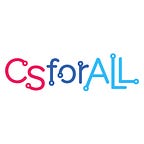EcoSystemsforCS Hosts National Workshops on Design Thinking and Strategic Planning
CSforALL continues National Initiative Work with Communities to Ensure All Youth have Access to High Quality Computer Science Education
As organizations and communities across the U.S. scrambled to adapt to the impact of COVID, so did the EcoSystemsforCS (E4CS) initiative at CSforALL. With support from Schmidt Futures, E4CS are 10 dynamic communities that came together to ensure all young people have equitable access to high quality computer science education.
Originally slated as a mid-year in-person convening in Columbus OH, we moved to a series of five consecutive virtual workshops. During May and June 2020, the 10 ecosystem planning teams participated in virtual design-thinking strategic planning workshops to further develop skills in creative solutions-based problem-solving. Each planning team represents different geographies and populations from Central Washington State; Worthington OH; Santa Fe NM; Tulsa OK; Saint Paul MN; Mission TX; Chicago IL; Miami FL; Birmingham AL; and Richmond VA.
In their own and across team breakout rooms, the E4CS cohort practiced the process and mindset of “yes and …” design thinking, created personas representing their audience, defined their persona need statement, and dug into aspects of strategic planning including identifying needs for policy, partnerships, funding, communications, community engagement, content, and outcomes.
In partnership with Danica Petroshius and Aileen Ma of PennHill Group, we facilitated interactive discussions among the E4CS cohort to focus on human-centered solutions, deepen their understanding of intended audiences, and consider solutions that stretched their thinking and were practical and broad enough to leave room for innovation.
Afterwards, some participants indicated that the virtual workshops were invaluable, and found that the design thinking process enabled them to consider new ideas and outline real possibilities. Participants particularly enjoyed the dedicated time to reboot, work with their planning team, and engage with others in the cohort to learn, collaborate, and problem-solve. Although the preference was for an in-person meeting, the value of virtual workshops also enabled many to include more people on the planning team than had we met in-person. As a bonus, they learned how to use new tools such as Jamboards and processes for virtual learning and engagement for their own work.
Over the next several months, the E4CS cohort will continue to learn from each other, from other ecosystem models as they develop their strategic plan.
Stay Tuned for Updates: https://www.csforall.org/projects_and_programs/ecosystemsforcs/
About the Author: An-Me has been an advocate and educational innovator for young people learning in the out-of-school time space for over 20 years. As a fellow at CSforALL, she has been leading the CSforOST and ecosystems efforts. She has extensive experience building networks and spearheading public-private partnerships and alliances with CEOs, senior government leaders, philanthropists, researchers, technologists, policymakers, and community leaders and practitioners to bring education and technology opportunities particularly for under-represented youth.
An-Me understands that systems change and innovation is the necessity of equity and sustainability. She is a creative problem-solver and a history of leading complex initiatives focused on using data and promising practices, raising public awareness, and leveraging partnerships for community solutions and policy change.
About EcoSystemsforCS: EcoSystemsforCS is a CSforALL initiative with support from Schmidt Futures to catalyze communities across the US in creating community-led systems change in K-12 computer science education.
